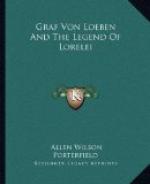[76] In F. GrAeter’s Idunna und Hermode,
eine Alterthumszeitung,
Breslau, 1812, pp. 191-92,
GrAeter gives under the heading, “Die
Bildergallerie des Rheins.”
thirty well-known German sagas. The
twenty-seventh is “Der
Lureley: Ein GegenstUeck zu der Fabel von
der Echo.” It is
the version of Vogt.
[77] Aside from the above, some of the less important
authors of
lyrics, ballads, dramas, novels,
etc., on the Lorelei-theme are:
J. Bartholdi, H. Bender, H.
Berg, J. P. Berger, A. H. Bernard,
G. Conrad, C. Doll, L. Elchrodt,
O. Fiebach, Fr. FOerster,
W. Fournier, G. Freudenberg,
W. Freudenberg, W. Genth, K. Geib,
H. Grieben, H. GrUeneberg,
G. Gurski, Henriette Heinze-Berg,
A. Henniger, H. Hersch, Mary
Koch, Wilhelmine Lorenz, I. Mappes,
W. Molitor, Fr. MUecke, O.
W. Notzsch, Luise Otto, E. RUeffer, Max
Schaffroth, Luise Frelin von
Sell, E. A. W. Siboni, H. Steinheuer,
Adelheid von Stolterfoth,
A. Storm, W. von WaldbrUehl, L. Werft,
and others even more obscure
than these.
[78] In Menco Stern’s Geschichten vom Rhein,
the story is told
so as to connect the legend
of the Lorelei with the treasures of
the Nibelungenlied.
In this way we have gold in the
mountain, wine around it,
a beautiful woman on it—what more could
mortal wish? Sympathy!
And this the Lorelei gives him in the
echo. In reply to an
inquiry, Mr. Stern very kindly wrote as
follows: “The facts
given in my Geschichten vom Rhein are
all well known to German students;
and especially those mentioned
in my chapter ‘Lorelay’
can bo verified in the book: Der
Rhein von Philipp F. W.
Oertel (W. O. v. Horn) who was, I
think, the greatest authority
on the subject of the Rhine.” Oertel
is not an authority.
In Eduard-Prokosch’s German for
Beginners, the version
of Schreiber was used, as is evident
from the lines spoken by the
Lorelei to her Father:
Vater, Vater,
geschwind, geschwind.
Die weissen
Rosse schick’ deinem Kind,
Es will reiten
auf Wogen und Wind.
These verses are worked into
a large number of the ballads, and
since they are Schreiber’s
own material, his saga must have had
great general influence.
[79] There would be no point in listing all of the
books on the
legends of the Rhine that
treat the story of the Lorelei. Three,
however, are important, since
it is interesting to see how their
compilers were not satisfied
with one version of the story, but
included, as becomes evident
on reading them, the versions of
Brentano, Schreiber, Loeben,
and Heine: Der Rhein: Geschichten
und Sagen, by W. O. von
Horn, Stuttgart, 1866, pp. 207-11;
Legends of the Rhine,
by H. A. Guerber, New York, 1907, pp:
199-206; Eine Sammlung
von Rhein-Sagen, by A. Hermann
Bernard, Wiesbaden, no year,
pp. 225-37.




